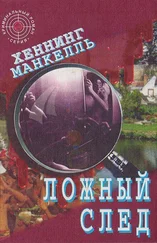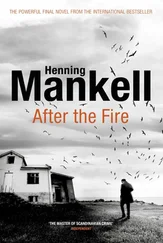At seven he called the team at Runnerström Square and Martinsson answered. Their conversation was brief. The team were not yet able to answer a single one of Wallander’s questions. He put down the phone and went to find Hansson, who was sitting in front of the computer with bloodshot eyes. Wallander asked if there had been any messages from the international community, and Hansson had only one word in reply: “Nothing.”
At that moment Wallander was overcome by rage. He grabbed one of the chairs in Hansson’s office and threw it against the wall. Then he left the room.
At eight o’clock he was back in Hansson’s office.
“Let’s go down to Runnerström Square,” he said. “We can’t go on like this. We have to get an idea of where we stand.”
They stopped by Höglund’s office on the way out. She was half asleep at her desk. They drove in silence. When they reached the apartment they saw Modin seated against the wall, Martinsson on his folding chair, and Alfredsson lying on the floor. Wallander asked himself if he had ever led a more exhausted and dispirited team. He knew that the physical exhaustion was due more to their lack of progress rather than to the events of the night before. If only they had come a few steps closer to the truth, if only they could break down the wall, they could each summon sufficient energy to see it through. But for now the dominant mood was one of hopelessness.
Wallander sat down on the chair in front of the computer. The others gathered around him, except Martinsson, who positioned himself in the background.
“Let’s sum up where we are,” he said. “What is the situation right now?”
“There are several indications that the date in question is the twentieth of October,” Alfredsson said. “But we have no indications of a precise time for the event, so we cannot know if it will begin on the stroke of midnight or later. Quite possibly the intended event is a form of computer virus that targets all of these financial institutions we’ve identified. Since they are mostly large and powerful financial institutions, we imagine the event has something to do with money, but if we’re talking about a form of electronic bank robbery or not we don’t know.”
“What would be the worst thing that could happen?” Wallander asked.
“Total collapse of the world financial markets.”
“But is that even possible?”
“We’ve been through this point before. If there were a significant enough disruption of the markets or a severe fluctuation in the dollar, for example, it could incite a panic in the public that could be hard to control.”
“That’s what’s going to happen,” Modin said.
Everyone stared at him. He was sitting on the floor next to Wallander with his legs crossed.
“Why do you say that? Do you know it for a fact?”
“No, not for a fact. But I think this is going to be so big we can’t even imagine it. We’re not going to be able to deduce what’s going to happen before it’s too late.”
“How does the whole thing start? Isn’t there a starting point, some kind of button that needs to be pressed?”
“I imagine it will be started by some action that’s so ordinary we would have trouble accepting it.”
“The hypothetical coffee machine,” Martinsson said.
Wallander was quiet. He looked around.
“The only thing we can do right now is keep going,” he said. “We don’t have a choice.”
“I left some diskettes in Malmö,” Modin said. “I need them in order to keep working.”
“I’ll send out a car to get them for you.”
“I’ll go too,” Modin said. “I need to get out. And I know of a store in Malmö that stays open late and has the kind of food I like.”
Wallander nodded and got up. Hansson called for a patrol car that would take Modin to Malmö. Wallander called Elvira. The line was busy. He tried again. Now she answered. He told her what had happened, that Modin needed to come by and pick up the diskettes he had left behind. She said it was no problem. Her voice sounded normal now.
“Can I expect to see you as well?” she asked.
“Unfortunately, I don’t have the time right now.”
“I won’t ask you why.”
“Thank you. It would take too long to explain.”
Alfredsson and Martinsson were leaning over Falk’s computer again. Wallander, Hansson, and Höglund returned to the station. When Wallander reached his office, the phone rang. It was the reception desk, telling him he had a visitor.
“Who is it and what is it about?” Wallander asked. “I don’t have any time right now.”
“It’s someone who says she’s your neighbor. A Mrs. Hartman.”
Wallander immediately worried that something had happened. A few years ago there had been a bad water leak in his apartment. Mrs. Hartman was a widow who lived in the apartment beneath his. That time she had called him at the station.
“I’ll be right there,” Wallander said and hung up.
When he reached the waiting area, Mrs. Hartman was able to assuage his fears. There was no water leak, just a letter for him that had been delivered to her.
“It must be the mailman,” she complained. “It probably came on Friday, but I’ve been away this whole time and only returned earlier today. I just thought it might be important, that’s all.”
“You shouldn’t have taken the trouble of coming down here,” Wallander said. “I rarely get mail that is so important it can’t wait.”
She handed him the letter. There was no return address on the envelope. After Mrs. Hartman had left, Wallander went back to his room and opened the letter. To his surprise he saw it was a notice from the dating service thanking him for his subscription and assuring him that they would forward any replies as they arrived.
Wallander crumpled the piece of paper and threw it in the trash. For the next couple of seconds his mind was a total blank. Then he frowned, took out the letter from the trash, smoothed it, and read it again. Then he looked for the envelope, still without knowing exactly why. He stared at the postmark for a long time. The letter had been posted on Thursday.
His mind was still empty.
Thursday. But at that point he had already received a reply from Elvira Lindfeldt. Her letter had arrived in an envelope that had been brought directly to his door. A letter without a postmark of any kind.
His thoughts were swirling around in his head.
Then he turned and looked at his computer. He wondered if he was going crazy. Then he forced himself to think logically and clearly. As he kept staring at his computer, a picture started to emerge. A plausible sequence of events. It was horrifying.
He ran out into the corridor and into Hansson’s office.
“Call the patrol car!” he shouted as soon as he came in. Hansson jerked back and stared at him.
“Which patrol car?”
“The one that took Modin to Malmö.”
“Why?”
“Just do it. Quickly!”
Hansson grabbed the phone. He got through to them in less than two minutes.
“They’re on their way back,” he said putting the phone down. Wallander breathed a sigh of relief.
“But they left Modin at the house.”
Wallander felt as if he had been punched in the stomach.
“Why did they do that?”
“Apparently he came out and told them that he was going to keep working from the house.”
Wallander didn’t move. His heart was beating very hard. He still had trouble believing that it was true. But he himself had suggested the risk of someone breaking into their computers on an earlier occasion. These break-ins weren’t necessarily limited to material surrounding the investigation. Someone could just as easily access more personal information — such as a letter that someone sent to a dating service.
Читать дальше












